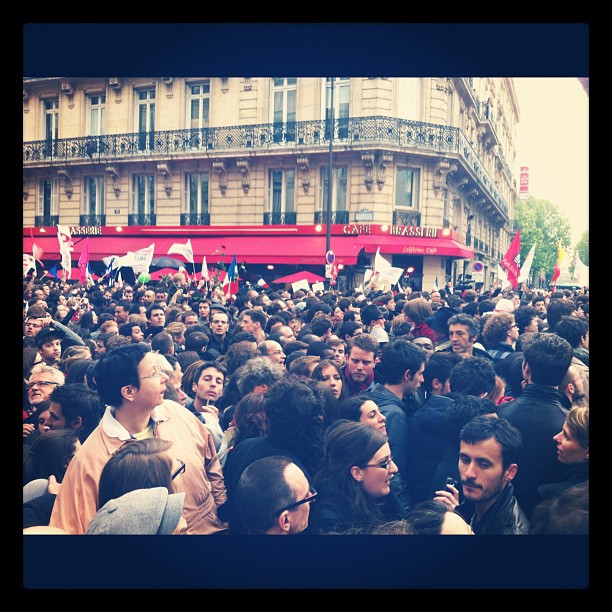The next time someone asks you the “what has Occupy done?” question, you can answer: changed the global political agenda to anti-austerity. A wave of elections across Europe this week has marked a pronounced shift. While elites continue to assert that there is no alternative to continued clampdown, voters have endorsed a new mood of anti-austerity. The content of such a politics is vague and no-one should expect dramatic transformations without continued pressure from social movements. The anniversary of Spain’s May 15 movement will now be the time to claim that such activist pressure has shifted the discourse and to move ahead to its implementation.
What is striking is that voters in the European elite nations France and Germany were as notably for change as in the marginalized Greek periphery. Equally, given the continued power of the bond and currency markets, that change is going to be hard to achieve. The euro has already lost 0.5% value by midnight European time, down to $1.30. Expect a major decline tomorrow morning.
It was in Greece that the strongest anti-austerity statement was made. Those parties that signed the “memorandum,” the agreement to the Troika-dictated bailout, are now in the minority. Syriza, the Coalition of the Radical Left, is at the time of writing close to securing second place overall on 16% with 42% counted, up from only 4.6% of the vote in the last election.
The Athens News website translated the post-election speech of party leader Alexis Tsipras as follows:
He said that Europe’s leadership, especially that of Germany, had to understand that the result was a crushing defeat for austerity policies. He also stressed that voters proved through the ballot box that the path out of the crisis did not pass through bailouts and austerity. He said that Syriza understood that its meteoric rise in this election did not reward a party or particular person but a proposal for a leftist government that would arrest the course of austerity policies and bailouts and promised that Syriza would do everything in its power to bring about a government that would terminate the Memorandum and loan agreements.
He hopes to form a left coalition, despite the pre-election declaration by the Communists that they would not participate. His call has been for a New Deal for Europe, which would totally transform the European Union. Consequently, the parties for the memorandum will do all they can to form a government with US and German help.
Whether that can be achieved will depend greatly on the new President of France, François Hollande. He certainly struck the right note tonight, declaring:
austerity is no longer inevitable.
Nonetheless, Hollande is every inch a member of the traditional French ruling meritocracy, having attended all the required grand écoles and served dutifully in the Socialist Party ranks. While this election of a Socialist is only the second in the Fifth Republic, it does not guarantee that anti-austerity can be delivered. Hollande has promised higher corporate taxes, higher income tax on those making one million euros or more ($1.4 million), and a variety of improved social benefits. Whether these can be achieved will depend greatly on the léglislatives, the parliamentary elections coming up.
In more good news, Hollande’s relatively narrow 4% margin of victory and the 80% turn-out suggests that the National Front strategy of calling for a boycott failed. Marine Le Pen looks like a protest vote candidate once more, rather than a serious alternative.
In Greece, however, abstention was massive, nearly 40% of the turnout. The repellent neo-Nazi Golden Dawn benefited from this to claim its first parliamentary seats, with their leader declaring:
I dedicate this victory to the brave guys with the black shirts.
Unfortunately, in a proportional representation system, abstention can let in the thugs–but if this is the best they can do in such a catastrophic moment, they are still a fringe phenomenon.
In the U.K. only 32% of voters participated in this week’s local elections. In German regional elections, none of the established pro-austerity parties improved their votes, with the Green Party and the new Pirate Party improving their positions quite notably in a country allergic to sharp political change for self-evident historical reasons.
The mood in the over-developed world has shifted to anti-austerity. No one party or political formation seems set to benefit from this, although the center-right that implemented austerity is perhaps the clearest loser. Days of action like May 12 in the U.K. and May 15 globally are vital to reassert the anti-austerity theme.
In the U. S., the implications are interesting. Should Obama continue to use empty slogans like “Forward” without specifying an anti-austerity agenda that has bite beyond his bits and pieces ideas currently on offer, he may well be defeated by the “if nothing else, vote the bums out” rule of thumb.
Movements like Occupy, the Indignados and the social movements in Greece are not electoral formations or political parties. We’ve suggested that another world is possible. It seems that even in the mainstream people are listening, or at least willing to listen.

